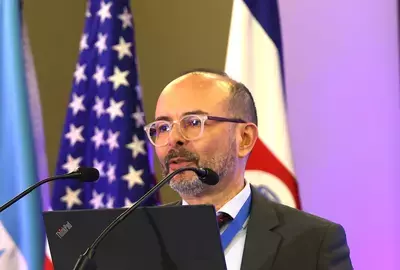
Gender and intersectional approaches in citizen security policy
The second day at Security Week started with a keynote address by Fabiola Zermeño followed by three thematic sessions on "Public Policies on Citizen Security with a Gender Perspective and an Intersectional Approach, "and a discussion forum. Each session focused on relevant aspects critical to understanding and combating violence against women and girls.
"Tools for measuring femicide and other forms of violence against women, girls and LGBTQ+ population" was the title of the first session on the use of data for dealing with violence. According to InfoSegura figures, throughout the region, nine out of every 10 victims of crime sexual crime are women and girls. This notwithstanding, the data indicates that over the course of a year, there has been a 30 per cent drop in intrafamily violence.
This issue was addressed by Silvana Fumega, Co-Director and Co-founder of Data Against Feminicide, who presented the "Project on standards for data on feminicides in Latin America." The intervention highlighted the importance of addressing the shortcomings in the data on femicides. Examples of this were statistical unreliability, the lack of exchange between institutions and the under-reporting of cases. The initiative Ms Fumega leads endeavours to overcome these challenges by measuring gender-based violence comprehensively. In addition, she shared lessons learned, stressing the need for an accurate and accessible information to inform public policies, enhancing their effectiveness in terms of violence prevention.
The Minister of Women's Affairs of the Dominican Republic Mayra Jimenez spoke about "Actions for Preventing Violence against Women and Girls" in her country. Minister Jimenez provided a detailed account of initiatives and campaigns implemented in recent years. Emphasis was on key accomplishments achieved thanks InfoSegura and the support of USAID. The SARA Chatbot is a digital assistant that leverages artificial intelligence to provide information and guidance to women, girls and adolescents regarding the risk of violence. The Study on Gender-Based Violence in the Workplace and Community provides both quantitative and qualitative data on the prevalence of violence against women in social and community settings. There is also the Multidimensional Violence Index to analyse the evolution of violence against women in the country from a multidimensional perspective. This data is instrumental in informing public policy decisions
Carmela Patricia Lanza, InfoSegura Coordinator in Honduras, was in charge of presenting the National Specialized Survey on Violence Against Women and Girls Age 15 and Older (ENESVMN). The work was done at the National Statistics Institute (INE) with UNDP support in partnership with the United States Agency for International Development, through the InfoSegura Regional Project, in conjunction with the Secretariat for Women's Issues (SEMUJER) and the Inter-institutional Committee of Honduras.
During the presentation, Ms Lanza noted the primary purpose of the work was to generate and disseminate data on the various forms of violence experienced by women and girls aged 15 and over, occurring within the last 12 months and throughout their lifetimes, in both public and private spheres. This information is intended to inform decision making processes. Data revealed that 52.8 per cent of women have experienced at least one form of violence in their lifetimes, encompassing physical, psychological, sexual, or economic/patrimonial violence and discrimination, and one in five experienced violence within the 12 months.
Next, presentations of studies and analysis carried out by InfoSegura. The first presentation on “Approach to costing care and prevention of violence against women and girls in El Salvador, Guatemala and Honduras” was delivered by Carlos Acevedo, who stressed the gravity of statistics on violence against women and girls, emphasizing the fact that these are the highest rates for feminicide in Latin America. The analysis, he explained was carried out to identify potential funding shortfalls in violence prevention programmes and he recommended linking budgetary allocations to measurable outcomes.
Assistant Coordinator InfoSegura Regional Project, Gerald Mora, presented the study on Analysing vulnerabilities and violence the LGBTQ+ population faces in Central America. The presentation included a description of the vulnerabilities of the LGBTQ+ population in the region, and recommendations included approval of legislation recognizing gender identity and the implementation of inclusive policies. Mr Mora concluded by noting the importance of training and generating information to understand and address the challenges that LGBTQ+ people face.
Towards the elimination of violence against women and girls
The following day was moderated by Ana Maria Diaz, UNDP Resident Representative in Guatemala. Her introduction focused on the need for the elimination of violence against women and girls to be incorporated in policies, plans and programmes. InfoSegura’s contributions in terms of studies and analysis, she elaborated, have gone a long way towards this objective.
First, Guillermina Martin, Gender Team Lead at UNDP Latin America and the Caribbean, spoke of the need to address gender inequalities in contexts of crisis and the importance of transforming social norms. Growing intersecting crises clash with gender norms, and the rapid pace of digitization also carries the potential to exacerbate existing inequalities, she remarked.
She considers that, "violence against women and girls is a citizen security issue, but it is not solved by citizen security policies." Ms Martin emphasized that effectively addressing gender-based violence requires the implementation of a comprehensive and multidimensional approach in public policy. This entails coming to consensus about concepts and standardizing methods of data gathering. It also requires advanced analyses of the relationship between gendered social norms, polarization and hate speech and gender-based violence. The legislation must be fortified, and the plans for eradicating, preventing, responding to, sanctioning and securing reparations must be strengthened. It is further essential to address social norms and foster positive masculinities through the education system, the media and monitoring gender-based violence in digital media, all with a territorial and community-based approach.
The closing speaker was Randall Brenes, Human Development and Democratic Governance Officer in UNDP Costa Rica. He shared the Costa Rican experience with Use of Information in designing and implementing policies on violence against women and girls. He noted InfoSegura Project contributions in countering gender-based violence and stressed the need for comprehensive approaches and cultural transformations to eliminated GBV from society.
He outlined three challenges for public policies, in order to address, prevent and respond to violence against women. First, shortcomings in data updating and homologation for indicators on GBV limit the efficacy of the measures under implementation. Second, a purely quantitative analysis of GBV can overlook essential qualitative dimensions, making it harder to get insights into the issue of violence against women. Finally, when resources assigned for citizen awareness are insufficient, this jeopardizes the capacity to sensitize and promote the necessary cultural changes.













